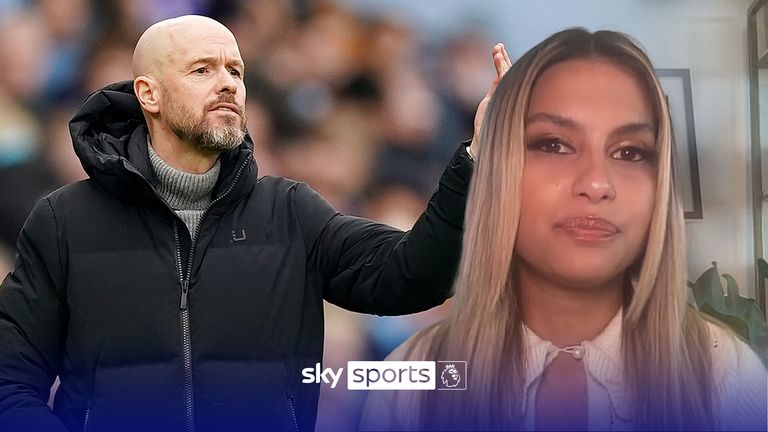Premier League clubs have voted in principle to introduce a spending cap from the 2025/26 season.
The rules, should they be approved in a final vote later this year, will replace the current Profit and Sustainability Rules (PSR) which have caused controversy in the Premier League this season.
Everton and Nottingham Forest were handed points deductions this season, which are still subject to appeal with a few weeks of the season to go, for breaching the current rules – causing top-flight clubs to reconsider the financial rules.
In a central London meeting on Monday, Premier League clubs put forward proposed new rules which included a spending cap on player wages, transfer fees and agent fees.
Sky Sports News chief reporter Kaveh Solhekol runs through the prospective new rules and what they mean for the Premier League clubs…
What will Premier League clubs be allowed to spend from 2025/26?
The details still need to be worked on but clubs not in Europe would be allowed to spend 85 per cent of their club revenue on squad costs. That involves wages for their players, amortised transfer fees and also agent fees.
The clubs that are in Europe would be allowed to spend a maximum of 70 per cent on squad costs. That is also in line with UEFA rules.
But what a lot of people have noticed is if you can only spend a maximum of 85 per cent of your revenue on your squad and you are a rich club, then you will always be able to spend more on your squad than the poorer clubs.
So what is the solution? There may also be ‘anchoring’ rules.
What is anchoring?
It’s going to be something you’re going to hear a lot about.
In its purest and simple form, it means all clubs would only be able to spend a maximum of the multiple of what the bottom club earns in TV revenue.
At the moment, the bottom club gets £103.6m. If the anchoring multiple, and this has been discussed, is going to be 4.5, then you would do £103.6m x 4.5, which results in £466m.
So £466m would be the spending cap in that instance. That is the maximum cap on what clubs would be allowed to spend on wages, amortised transfer fees and also agent fees.
The details are still to be ironed out, so the multiple could be 5 or 6 as well. This is what is being discussed by the Premier League clubs at the moment.
Will these new rules definitely be approved?
These rules are in principle, so we haven’t had the final vote yet.
What is happening now is Premier League executives, having had the green light from the clubs to do some more work on these proposals, will go away and draw up the legal rulebook, update that and then present it at the Premier League AGM next month, when there will be a final vote.
But it looks all but certain that we will have the ‘anchoring’ rules and the spending cap from the season after next because when an informal vote was taken on Monday, only three clubs voted against the spending cap: Manchester United, Manchester City and Aston Villa. Chelsea abstained from voting.
Why did those clubs vote against it?
This whole concept of ‘anchoring’ is controversial. The Premier League has become the biggest, most exciting league in the world because clubs have been allowed to spend a lot of money on their squads, wages, agents fees and the infrastructure on their stadiums. Critics will say it will move in a different direction if you restrain how much clubs can spend on their squads.
If you tell Man City: ‘you can only spend £466m on your squad’, they can come back on you and say: ‘Our turnover is £800m to £900m, who are you to tell us how much money we can spend on our squad?’ If you’ve earned the money, you feel you should have the right to spend the money.
As for Manchester United, there’s obviously new money there and Sir Jim Ratcliffe has bought 25 per cent of the club. They want to invest and turn things around and they feel having a spending cap in place might mean they have to operate with one hand tied behind their back.
There are also concerns it will affect how competitive the big clubs are in Europe. Other countries have their own spending rules as well, but for the Premier League to maintain its position as the most watched and most exciting football league in the world, a lot of people would say that Premier League clubs should be allowed to spend what their owners want to spend as long as there isn’t the threat of clubs going out of business.
How is this different from PSR?
There’s a general acceptance that the current PSR rules are not fit for purpose – that is why clubs want to change the rules.
The issue with these PSR rules is that clubs are allowed to lose a maximum of £105m over three seasons.
We have seen clubs such as Everton and Nottingham Forest lose war with that and that has led to a lot of trouble – the situations with points deductions, appeals and it affects the league table. All the independent tribunals and appeals have been a distraction and it has, I think, affected the image and integrity of the Premier League.
That is why the Premier League clubs have got together and said: ‘we need to have new rules and we need them quickly.’
We are going to have the PSR rules for next season. These new financial regulations would come in the season after next.
Ad content | Stream Sky Sports on NOW
Stream Sky Sports live with no contract on a Month or Day membership on NOW. Instant access to live action from the Premier League, EFL, F1, England Cricket and so much more.
Get Sky Sports on WhatsApp!
You can now start receiving messages and alerts for the latest breaking sports news, analysis, in-depth features and videos from our dedicated WhatsApp channel!


























+ There are no comments
Add yours